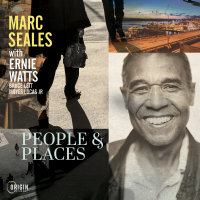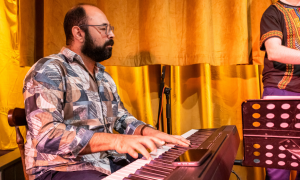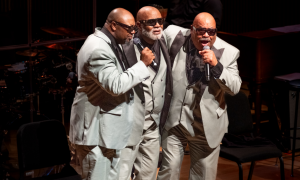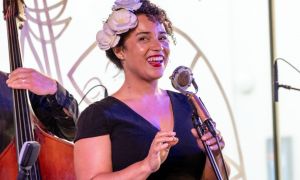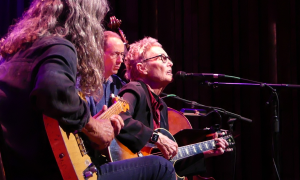Home » Jazz Articles » Live Review » TD Ottawa Jazz Festival 2014, Days 7-9
TD Ottawa Jazz Festival 2014, Days 7-9
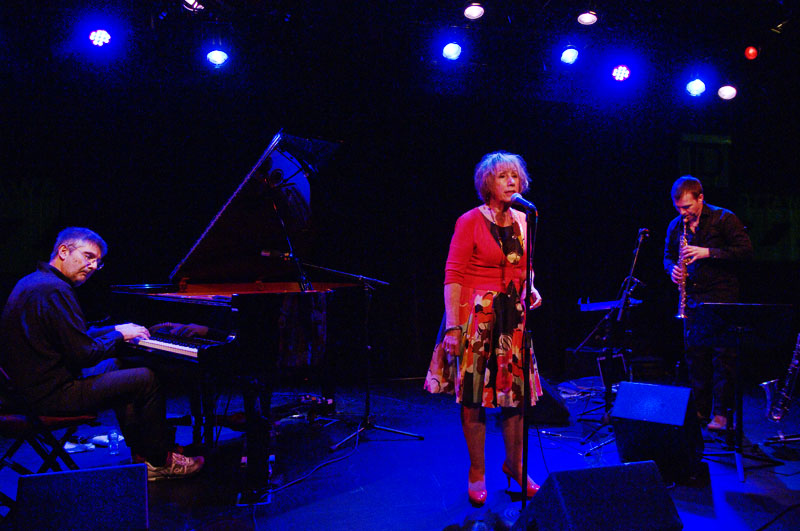
Anat Fort / Susanna
Torben Waldorff Wah Wah / Norma WInstone
Partisans
TD Ottawa Jazz Festival
Ottawa, Canada
June 20-July 1, 2014
For the last three days in Ottawa before heading to Montr©”al for five days of the Festival International de Jazz de Montr©”al, the emphasis was entirely on the Improv Invitational series, at the National Arts Centre's intimate, club-like Fourth Stage. It was an eclectic mix of artists, ranging from an Israeli pianist, a Norwegian singer/songwriter and a Danish guitarist to two artists from the broad-spectrum British scene: one, a legend, the other, if not exactly a legend, then at the very least a group considered to be the founding father of the current British revival that includes groups like

Polar Bear
band / ensemble / orchestra
Led Bib
band / ensemble / orchestrab.2003
With temperatures and humidity soaring outside, the dark, cool Fourth Stage seemed like the perfect place to be for three days of music ranging from contemporary, rock-informed jazz and beautiful voc al interpretations to a taste of Norwegian gloom and one of the finest solo piano recitals to hit Ottawa since the elimination of the late afternoon Connoisseur Series a few years back.
June 26: Anat Fort
She may have first found her way onto the international map with A Long Story, her 2007 debut for ECM Records, but pianist

Anat Fort
pianob.1970
Fort's next recording is already in preparation—another recording with her trio but, this time, also featuring guest clarinetist/saxophonist/ECM label mate
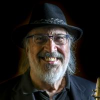
Gianluigi Trovesi
saxophoneThe diminutive pianist came onstage and, following a moment of silent preparation, launched into "Lullaby" from A Long Story. Hearing the piece solo contrasted substantially from the freer approach on the record, which also featured clarinetist

Perry Robinson
clarinet1938 - 2018
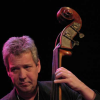
Ed Schuller
bass, acoustic
Paul Motian
drums1931 - 2011
A relaxed performer, Fort quickly created a comfortable rapport with her audience. She introduced all her songs, often explaining the meaning behind their titles. One, ?????????? or "Me'laf'fon" in Hebrew, translates into "cucumber" in English and, according to Fort, had no other meaning than it being an interesting sounding word; others, like And If's "Lanesboro," referred to personal experiences, in this case the Minnesota town where she spent time in a retreat, composing; and still others, like the same album's "Clouds Moving," while written for the Minnesota skies, made more personal for the pianist's Ottawa audience by relating how, after waking up earlier today following an early morning (and five-hour late) arrival by plane, she saw similar movement in the Ottawa sky and, so, dedicated the song to them.
It was an all-too-short performance at just over an hour including a well-deserved encore, but it was plenty long enough to establish Fort's increasing potential for broader recognition. Even when there was complexity in the music, as in "Clouds Moving," Fort delivered it with such fluid ease as to make it not just seem easy, but to make an irregularly metered song that alternated bars of 5/4 and 4/4, feel utterly natural. And when the music was spare and gentle, as was her delicate encore of "Lanesboro," it was clear that beneath such a simple construct lay greater depth and profundity. It was the year's only solo piano performance and strongly suggested that, if Fort's next recording is to be a quartet date, then ECM should seriously consider a solo recording when the time comes for her fourth recording for the label.
June 26: Susanna
A dark, moody performance by Susanna, with her group Susanna, was one of those Fourth Stage performances that really should have been better attended; all that meant was that those who did decide to forego at least the first part of the main stage show at Confederation Park were treated to something the city rarely gets to experience—one of Norway's most intriguing piano-playing singers/songwriters whose music was dark, moody and largely very down-tempo; music that demanded as much of its audience as it did the group that played it. "Thank you for not going to Earth, Wind & Fire," Susanna quipped coyly, early in the set.
In addition to Susanna (sister of ECM recording artist, pianist Christian Wallumr?d), her touring trio—which, after some west coast dates wrapped up a short North American tour in Rochester, NY the following evening—included brother Fredrik (drums, vocals, sound engineer) and her partner, guitarist Helge Sten. One of the co-founders of renowned noise improv groups

Supersilent
band / ensemble / orchestra
Led Zeppelin
band / ensemble / orchestrab.1968
That's not to say he didn't shoot for some extremes during Susanna's set, which drew on material dating back to her earliest recording, 2004's Susanna and the Magical Orchestra debut, List of Lights and Buoys (Rune Grammofon), though the preponderance of material seemed to be culled from 2012's Wild Dogs. While Wallumr?d delivered a simple but strong pulse on that album's "Wild Horse Wild Dog," Sten kicked in some serious overdrive and, with whammy bar creating great swoops and rapid tremolos, entered

Jimi Hendrix
guitar, electric1942 - 1970
"I am Susanna and we are Susanna," she said, in one of her simply stated introductions to the one-hour, 14-song set that also included "some Norwegian gloom" with the suitably slit-your-wrist bleakness of "Death Hanging," written in 2012 for the Oya Container during the Oyafestival in Oslo, a collaboration with singers Siri Nilsen and Susanne Sundf?r. And as much as she emphasized her own material, Susanna's career has also been defined by her imaginative reinventions of music by everyone from Sandy Denny and Lou Reed to Bob Dylan and Phil Lynott, whose Thin Lizzy rocker, "Jailbreak," was reinterpreted here as a stark, melancholy ballad. Her Magical Orchestra look at Joy Division's "Love Will Tear Us Apart" was delivered with even darker subtext here, while her look at Leonard Cohen's "Who By Fire"—first heard on her particularly superb collaboration with Baroque harpist Giovanna Pessi on If Grief Could Wait (ECM, 2012) was, in performance, even sparer, with Susanna, perhaps even more quietly, finding her way to the song's accusatory core.
It was, indeed, a shame that there was less promotion of Susanna's Ottawa appearance. While she's been to North American once before with the Magical Orchestra (the orchestra being

In The Country
band / ensemble / orchestra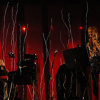
Morten Qvenild
pianoJune 27: Torben Waldorff Quartet Wah Wah
The second Friday of the TD Ottawa International Jazz Festival brought a triptych of international artists to the NAC Fourth Stage Improv Invitational series, each representing a different European country: Belgium, Denmark and the United Kingdom. One was a completely unheard of large ensemble (Belgium's Flat Earth Society); another, a more established guitarist (

Torben Waldorff
guitar, electricb.1963

Norma Winstone
vocalsb.1941
Having been forced to miss Flat Earth Society, the first show of the day was Torben Waldorff's Quartet, performing music culled from his four ArtistShare recording, from 2012's Wah Wah right back to his 2006 debut for the label, Brilliance.
While the personnel has shifted slightly from album to album, with people like saxophonist

Donny McCaslin
saxophone, tenorb.1966

Gary Versace
piano
Sam Yahel
organ, Hammond B3
Jon Cowherd
piano
Matt Clohesy
bass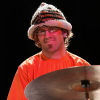
Jon Wikan
drums
Adam Birnbaum
piano
Greg Osby
saxophoneb.1960

Ryan Keberle
tromboneb.1980
A clearly talented guitarist and writer whose personal touchstones define his approach and differentiate him from the pack, including a motif-based approach to carefully built solos that were often predicated on broad intervallic leaps and sparse but orthodox-busting lyricism, Waldorff's hour-long set moved from the gently pulsing "You Here" to the 6/8 "Cutoff (The Eleventh Bar)" (both off Wah Wah), which kicked off with a brief a cappella solo from Clohesy that helped explain why the bassist is in such demand from artists including

Darcy James Argue
composer / conductorb.1975

Seamus Blake
saxophoneb.1970

Alan Ferber
trombone
Geoffrey Keezer
keyboardsb.1970

David Weiss
trumpetb.1964

Christine Jensen
saxophone
Ingrid Jensen
trumpetb.1966

Darcy James Argue
composer / conductorb.1975

Denise Donatelli
vocalsIf there was any complaint it was that Wikan was, at times, a little loud in the room, threatening to overpower his band mates, but it was a small one in an exhilarating set that undoubtedly made Waldorff some new fans in the roughly half-filled Fourth Stage. Waldorff's inventive approach to writing—from the balladic title track of American Rock Beauty (ArtistShare, 2010) to Afterburn's fierier "Squealfish"—coupled with a more considered and thoughtful approach to playing that differentiated him from contemporaries like

Adam Rogers
guitarb.1965

Kurt Rosenwinkel
guitarb.1970
Waldorff's ongoing work with Clohesy and Wikan has allowed him to build both a longstanding chemistry and personal language, the kind that can only evolve through playing with the same people for many years; there's still, however, the energy that comes from new encounters, and by fleshing out his groups with a variety of different players, the guitarist has also allowed his music so change with every new recruit. With Birnbaum a pianist who surely deserves broader recognition—as, of course, does Waldorff—he brought a vivid sense of the unexpected, whether on grand piano or Fender Rhodes. The result was a set high on energy, melody and conceptual focus—a performance that those who attended will not soon forget.
June 27: Norma Winstone
It's hard to believe that, in a career now spanning over 45 years, the now-legendary British singer

Norma Winstone
vocalsb.1941

John Taylor
piano1942 - 2015

Kenny Wheeler
flugelhorn1930 - 2014

Mike Westbrook
composer / conductorb.1936

Michael Garrick
piano1933 - 2011
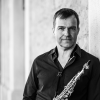
Klaus Gesing
saxophone, soprano
Glauco Venier
pianoFortunately, the 2014 TD Ottawa Jazz Festival has righted the wrong and, while the write-up in its program did little to address her importance as one of the most significant and influential jazz singers still alive today, it didn't hurt her capacity to draw an audience, with the Fourth Stage just slightly under a sell-out of enthusiastic people excited to experience Norma Winstone and her trio in the flesh.
Three of the trio's recordings are on ECM Records, beginning with 2008's Distances, followed by 2010's Stories Yet to Tell and, most recently, this year's Dance Without Answer (2014), from which Winstone culled the majority of the trio's material for 70-minute set. That the interpretations were both reverent to the arrangements on the recordings while, at the same time, delivered with a kind of effortless freedom that made them entirely different experiences, went without saying.
What's perhaps less evident on the recordings, however, is how much fun this trio has together. At one point, between songs, Venier walked across the stage to say something to Gesing; with Winstone looking at him as if she was thinking "what are you up to?" he said to her, "I have to talk to Klaus," to which Gesing quickly quipped, "As far as dance performances, this is it." These folks were sharp, and it was this kind of playful banter that made the performance more than just a stellar example of trio interplay and the real potential of the human voice, with WInstone going well beyond the conventional scat singing so often heard. Not that Winstone can't scat—she can, and she did—but her approach to improvising with her trio went farther than that, with articulations that were less bebop and more natural articulations that blended seamlessly with the trio, in particular Gesing, whose saxophone work soared above around, below and occasionally with Winstone, and whose bass clarinet work was—and always has been—particularly impressive.
While possessing plenty of chops, Gesing proved himself a musician more concerned with the core of a song than meaningless displays of virtuosity—a virtuosity that everyone in the trio clearly possessed and demonstrated when the time was right and the song demanded it—but he was just as comfortable delivering long, low register notes made even deeper through his subtle use of electronics throughout the set. His bass clarinet work on the trio's reading of Madonna's "Live to Tell"—a song that's also been covered by

Bill Frisell
guitar, electricb.1951
From her original lyrics, written to music by Venier, Gesing and

Ralph Towner
guitarb.1940
Venier remains, in fact, a largely hidden treasure: a pianist who, like fellow countryman and ECM label mate

Stefano Bollani
pianob.1972
Early in the set WInstone joked about having CDs for sale, hoping that people would buy them so she wouldn't have to bring them home with her. She needn't have worried. Following a set that will easily rank as one of the festival's best this year, with all three members of the trio at the merchandise table signing CDs after the show, not only was there not a single copy left for her to take with her, she could have actually sold more if she'd had them.
June 28: Partisans
While normally taking the night before heading to Montreal off to finish writing up the Ottawa report, with Britain's Partisans hitting the Fourth Stage at 6:00PM, an exception clearly had to be made. At Jazzahead! 2011 in Bremen Germany, catching just 15 minutes of a 30-minute showcase was sufficient to list it as one of the year's best live performances. So given 70 minutes or so and a new record to deliver, Swamp (Whirlwind Recordings, 2014)—not due for release until late September, but with copies available for sale during a North American tour that took the group across the continent, from Vancouver to Ottawa, from Seattle to New York and from Toronto to Montreal—how did a full Partisans performance match up to those 15 incendiary minutes in Germany three years ago?
From the first moments of "Flip the Sneck"—Swamp's opening track and the group's set opener at the Fourth Stage—it was clear that that energy was not only still there, but it was ratcheted up even further while, at the same time, being paced for the demands of a longer set. From saxophonist

Julian Siegel
saxophone, tenor
Gene Calderazzo
drums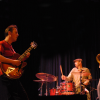 "
data-original-title="" title="">Thaddeus Kelly and guitarist
"
data-original-title="" title="">Thaddeus Kelly and guitarist 
Phil Robson
guitarAnd a good one it was, too, as he navigated the tune's generous changes with the kind of effortless aplomb that's given the group the title of "godfathers of the new wave of British Jazz." After Siegel was finished the tune turned back to the half-time funk for a solo from Robson that, once again, found the guitarist employing what is, quite possibly, the ugliest fuzz tone in jazz, delivering a blinding solo that matched Siegel's, note for energetic note.
"It's quite a responsibility to live up to, this 'godfathers of the new wave of British jazz,'" said Robson later in the set, as he and Siegel, in addition to trading solos, also shared the duty of introducing the music to its audience. "We're not that old yet," he said, as he introduced "Thin Man," also from Swamp and built, as he described in a recent All About Jazz interview also featuring Siegel—the two representing the group's principle composers—as "playing around with these shapes—these quite dissonant little shapes—on the guitar, and somehow there was something kind of scientific or geometric about them." Indeed, the opening patterns were both dissonant and somehow mathematical in conception, but as the song continued it opened up into a fierier 6/8 pulse that was bolstered by Kelly and Calderazzo, underpinning impressive solos from both Robson and Siegel.
Siegel's "Flip the Sneck"—which Siegel described to the roughly half-full Fourth Stage audience as "a Northern English term that even we don't know what it means (despite, in the interview, explaining that ..."a sneck is actually a northern English/Scottish word for a latch on a door and this comes from a gig we did in Nottingham, and there's a promoter there who'd say, about the dressing room, 'Can you flip the sneck on the way out?' And for us it was like, 'What the hell are you talking about? We've no idea what you're talking about.' So, it's just an expression that somehow reminds me of home")—along with Robson's "Thin Man," were just two of five songs that the group played from Swamp, the other three compositions culled from their previous four recordings including the high energy title track to Sourpuss (Babel, 2000) and, from the same album, the initially dark-hued but ultimately brightly swinging "The Missing Link," as well as "Wise Child," which Siegel explained was written as a dedication to

Wayne Shorter
saxophone1933 - 2023
Partisans albums manage to capture some of the group's energy and synergistic interplay, but there's something that happens in performance that the group has yet to capture in the studio; maybe a live album would be the next logical step? Robson, using a single multi-purpose effects pedal that not only continued to give him one of the truly ugliest distortions ever heard on a jazz record ("That's the nicest thing anyone's ever said to me," Robson replied, laughing, in the interview), but a wah wah, pitch shifter and ring modulator as well, assuming considerable responsibility has he provided linear counterpoint or unison with Siegel and/or Kelly as well as chordal support that, in some cases, like the title track from Swamp, moved comfortably into '70s-era electric

Miles Davis
trumpet1926 - 1991
At times shifting textures constantly—from atmospheric wah wah tones reminiscent of "He Loved Him Madly," from Davis' Get Up With It (Columbia, 1974), to locking in ring modulation for an oblique solo that turned more consonant when he shifted to a harmonized and overdriven tone for some lightning-fast phrases that seemed almost impossible were it not for the evidence in front of the audience's eyes and ears, before suddenly cueing to a knotty unison line that served as the launching point for one of Siegel's best solos of the evening, bolstered by Kelly and Calderazzo's high velocity funk groove and Robson's tremolo-drenched chordal support.
Partisans' music, almost by definition, shifts gears constantly—clearly something that keeps things interesting for the band, which has to be fully on its toes at all times since any one of its four members can signal a shift onto which the rest must somehow grab hold. But while lesser groups might sound unfocused or uncertain of who and what they are, Partisans possesses a clear identity and an unmistakable sound that somehow manages to transcend all the perils that the group seems to put regularly in its way with full intent. And if it's almost impossible to describe what, exactly, Partisans is—amalgamating, as it does, everything from African and Caribbean influences to modernistic expansions of the jazz tradition and, when the group rocks out, doing so with complete and utter authority and credibility—truly matters not.
What Partisans appears to be is four of Britain's finest players—drummer Calderazzo may be American born, but he's lived in the UK for more than 15 years now and so, like Canadian expat

Kenny Wheeler
flugelhorn1930 - 2014

Michael Janisch
bassb.1979
With a reputation already firmly cemented in the UK, Partisans may have been dealing with the unusual position of playing at venues and festivals in North America where it is relatively unknown, but if its Ottawa performance is any indication, not only does the group understand that an audience is built a few people at a time, but that it can leave Ottawa for Montreal the next morning confident some new fans have, indeed, been made—fans who may not have known who the group was prior to its 6:00PM performance, but have now been converted to the cause and will follow the group's next steps as it approaches the release of Swamp at the end of September.
Wrap-Up
While there have been some superb shows across the board at the TD Ottawa Jazz Festival's various venues, the award for best series of 2014 most certainly has to go to the Improv Invitational series at the National Arts Centre's Fourth Stage. It's hard to believe that, only a decade ago, the series did not exist and there was no real forum for groups like Partisans, Sun Rooms,

Harris Eisenstadt
drumsAnd, as ever, the festival would not be able to succeed without the hundreds of volunteers whose goal is clearly to make the event as pleasant as possible for fans, media and other guests of the festival. And as the festival looks to adjust its program to meet increasing financial and demographic demands, the relatively small core group of people that manage the festival year 'round may come under scrutiny at times but invariably deliver, whether it's top-notch programming, superb treatment of media or ears that are always open to the wants of its fan base. If proof need be found, just look at the nightly jam session—run this year by the core trio of bassist

John Geggie
bassb.1960

Roddy Ellias
guitarb.1949

Nick Fraser
drumsb.1976
With 2015 representing another significant milestone for the festival as it approaches its 35th year, exactly how it will celebrate this milestone is as yet uncertain but, based on this year's program, one thing is certain: there will be plenty of jazz for those who want it, and plenty of tangential or extracurricular programming to bring in more people to a festival that clearly understands the challenges that not only face its survival, but the survival of all jazz festivals across the continent.
Photo Credit: John R. Fowler
Days 1-2 | Days 4-6 | Days 7-9
Tags
Comments
About Partisans
Instrument: Band / ensemble / orchestra
PREVIOUS / NEXT
Support All About Jazz
 All About Jazz has been a pillar of jazz since 1995, championing it as an art form and, more importantly, supporting the musicians who make it. Our enduring commitment has made "AAJ" one of the most culturally important websites of its kind, read by hundreds of thousands of fans, musicians and industry figures every month.
All About Jazz has been a pillar of jazz since 1995, championing it as an art form and, more importantly, supporting the musicians who make it. Our enduring commitment has made "AAJ" one of the most culturally important websites of its kind, read by hundreds of thousands of fans, musicians and industry figures every month.
Go Ad Free!
To maintain our platform while developing new means to foster jazz discovery and connectivity, we need your help. You can become a sustaining member for as little as $20 and in return, we'll immediately hide those pesky ads plus provide access to future articles for a full year. This winning combination vastly improves your AAJ experience and allow us to vigorously build on the pioneering work we first started in 1995. So enjoy an ad-free AAJ experience and help us remain a positive beacon for jazz by making a donation today.
Ottawa
Concert Guide | Venue Guide | Local Businesses
| More...
Ottawa Concerts
Dec
23
Tue
In The Christmas Mood with The Glenn Miller Orchestra
National Arts Centre
Ottawa, Canada
Feb
6
Fri
Sinatra symphonique : Marc Hervieux
Casino Du Lac-leamy
Gatineau, Canada
Ottawa
Concert Guide | Venue Guide | Local Businesses | More...In The Christmas Mood with The Glenn Miller Orchestra
National Arts CentreOttawa, Canada
Sinatra symphonique : Marc Hervieux
Casino Du Lac-leamyGatineau, Canada


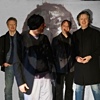



 Buy Now
Buy Now





